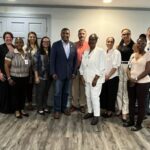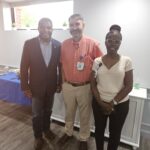This story from Roanoke Rapids Daily Herald.
ROANOKE RAPIDS — U.S. Rep. Don Davis visited Rural Health Group employees on Aug. 12 to listen to their needs as a community health service. During a meeting with the congressman, Chief Executive Officer Yvonne Long-Gee told Davis that Rural Health has been trying to be innovative to attract new workers.
“A lot of people want to work here — they want to take care of patients, but they don’t want to live here,” Long-Gee said. “And so one of the things that we’ve done — I think that’s innovative, and we’re very proud of, is residential housing. We have condos, and we’re now about to build housing for our residents, but that’s one of the things that we do, because it is difficult to recruit and attract providers. It costs us tons of money to actually look at locum providers, because our goal is always to have access to care, and I think workforce is one of the biggest issues that we deal with.”
Andrew J. Pernesky, Chief Financial Officer, said Rural Health has seven condos for residents and locums. Pernesky said the organization hires providers and puts them up in the condos until they can find housing, and is currently working with the City of Roanoke Rapids to change zoning from commercial to begin building duplexes at the end of the month.
“So next year is our goal to make sure that we have that housing if they want to move into it — that we have something available,” he said.
Long-Gee said the goal is to end up with nine to 12 units for Rural Health’s Residency Program.
The group also discussed its dental services, to which Robin Harrison, director of Dental Operations, said Rural Health was awarded a grant to purchase a dental mobile unit. Harrison said the first goal is to serve Head Start and pre-K at KIPP Gaston.
“We have three dental clinics and recruitment is a big thing for us too, because it is hard for us to get dentists, and we have so many patients in this area that have Medicaid, but unfortunately, don’t have a dental home,” she said. “And so that’s really why we need recruitment.”
Harrison said last year, they served about 43,000 patients, with 78% self-paid receiving $35 for cleaning and $50 for extractions through RHG’s sliding program.
“We’re proud to be able to serve our community by giving them affordable dental care, even if they don’t have insurance,” she said. “But 46% of our patients do receive Medicaid. So it is very important that we keep the coverage so that they can receive care.”
Congressman Davis asked about the impact of House Resolution 1, also known as the One Big, Beautiful Bill Act, or “Big Beautiful Bill,” by President Donald Trump, who signed it into law in July after it was approved in Congress. One of the cuts was to Medicaid, slashing more than $900 billion over 10 years, which is 14% of the total spending, according to reports.
Kesha Rooks, chief deputy director of RHG, said it will be devastating because it will not just affect dental and medical care, but also access to pharmacy through transportation. Rooks said Medicaid covers transportation for specialty care or for routine appointments.
“It feels like it’s going to be counterintuitive to the goal of keeping people out of the hospital,” she said. “We’ve been working hard as a community to try to keep people in the appropriate setting for health care. And now, when we take away their insurance, what they’re going to say is, ‘Then, I’ll go to the emergency room, because they have to treat me regardless.’ ”
Rooks said the big concern is that people will become less engaged if they feel that they have no insurance.
Long-Gee added to the topic.
“We already have a workforce issue, so we already know that there’s going to be an impact, and those who got Medicaid through expansion are now going to lose that Medicaid, and it’s a huge part of our service line,” she said.
Long-Gee said about 29% of their patients are on Medicaid, but said there is also Medicare and private insurance, including sliding fees.
“But we’re very concerned that over 50% of our population is going to be impacted by the things that are going on,” she said. “And we’re grateful for the amount of money that we receive from the federal government.”
Congress Davis listened to the concerns delivered at the meeting and said it is important for him to recognize the work that is taking place at the community health centers.
“I believe that we’re fortunate in many ways with those across the East here, and I would add, just imagine if you would, if we did not have community health centers,” he said. “I mean, that’s something I just can’t even imagine.”
Long-Gee said RHG has a great relationship with ECU Health North Hospital.
“And this is not just Halifax County, this is not a few county issues, this is a national issue that we’re having across our nation and everywhere,” she said.
Long-Gee also brought up that there is a shortage of OB-GYNs and a pharmacy desert in the area.
Congressman Davis encouraged them to continue bringing up their concerns to help bring about change.
“We tend to see the highest healthcare disparities in the East,” he said. “And it’s this — what you’re helping to close the gap on.”





